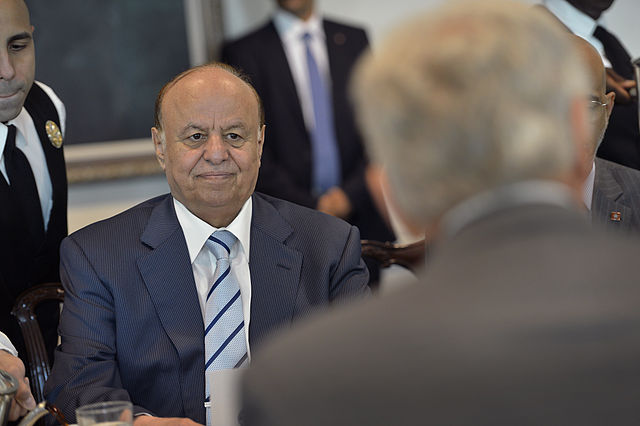by Derek Davison
In addition to its ongoing campaign against al-Qaeda in the Arabian Peninsula (AQAP), the United States has been instrumental in enabling Saudi Arabia’s effort to reinstall Yemeni President Abd Rabbuh Mansur Hadi, whom rebels drove out of the capital, Sanaa, in early 2015. A coalition, organized by the Saudis, came to Hadi’s aid later that year in part to counter what Riyadh perceives to be Iran’s support for the rebels. That intervention has caused massive suffering—thousands of people have been killed, millions are starving or at risk of starvation, and Yemen is now suffering from the worst cholera outbreak in human history. It has also strengthened AQAP’s position in south Yemen. It has not, however, brought Yemen’s civil war any closer to a resolution.
On September 27, Congressman Ro Khanna (D-CA) along with three co-sponsors—Thomas Masse (R-KY), Mark Pocan (D-WI), and Walter B. Jones, Jr. (R-NC)—introduced House Concurrent Resolution 81: “Directing the President pursuant to section 5(c) of the War Powers Resolution to remove United States Armed Forces from unauthorized hostilities in the Republic of Yemen.” If passed, President Trump would be required under the War Powers Resolution to end American support for the Saudi-led mission in Yemen, though American actions targeting AQAP would not be affected.
The Yemen Peace Project has written an open letter in support of the H.Con.Res. 81 that has been signed by 65 NGOs, including Just Foreign Policy, Win Without War, the Friends Committee on National Legislation, CREDO Action, CODEPINK, MoveOn.org, Jewish Voice for Peace, and the Project on Middle East Democracy. The text of that letter is included below:
We, the undersigned organizations, write to applaud your decision to introduce House Concurrent Resolution 81 to force a debate and vote on ending unauthorized U.S. military involvement in Yemen’s civil war. By providing technical, logistical and other military support for for the Saudi/UAE-led coalition in Yemen, the U.S. has facilitated numerous violations of international humanitarian law in Yemen and the creation of the largest humanitarian crisis in the world.
Since March 2015, the U.S. has provided the Saudi-led coalition in Yemen with political and military support, including targeting intelligence, mid-air refueling, and other logistical support. U.S. personnel reportedly work alongside Saudi and other counterparts in the coalition’s joint command center. CENTCOM has publicly confirmed that the U.S. continues to provide mid-air refueling to the coalition, despite having no information on the objectives, flight plans, or targets of the refueled missions and no way to verify whether such missions comport with the laws of armed conflict or US national security objectives. U.S. weapons sold to Saudi Arabia have been misused repeatedly in airstrikes on civilians and civilians objects that are the leading cause of civilian casualties in the conflict and destroyed Yemen’s vital infrastructure. This destruction of infrastructure has exacerbated the world’s largest hunger crisis and created the conditions necessary for the largest cholera outbreak ever documented.
Yet despite the fact that the U.S. is actively aiding and abetting coalition abuses, U.S. military involvement in this disastrous conflict in Yemen has never been debated publicly. This war of attrition has been waged using U.S. weaponry, military support, and personnel without congressional authorization for far too long. As the Trump Administration has consistently ignored human rights and civilian harm in its national security decisions, and looks to take a more aggressive posture in the region, Congress must send a clear signal that U.S. military involvement in Yemen’s civil war requires congressional authorization. Without it, U.S. support for the Saudi-led coalition in Yemen violates the Constitution and the War Powers Resolution of 1973. Congress has a constitutional and ethical duty to ensure any and all U.S. military operations comply with domestic and international law, and U.S. participation in the war in Yemen raises numerous legal and moral questions that must be resolved by Congress. Congress has an additional responsibility to do all in its power to convey to the administration and US allies in the region that more must be done to address the urgent humanitarian crisis facing millions of Yemenis.
The war has also created a security vacuum in Yemen that poses a significant security threat to the region and the United States. Al-Qaeda in the Arabian Peninsula (AQAP) is stronger than it has ever been. The U.S. State Department recently stated that “AQAP, in particular, has benefitted from this conflict by significantly expanding its presence in the southern and eastern governorates. It has successfully inserted itself amongst multiple factions on the ground, making the group more difficult to counter.” Iran has also taken advantage of Yemen’s instability, and benefits the longer the conflict drags on; by smuggling limited amounts of arms into Yemen, Tehran has further embroiled its Gulf rivals in an unwinnable war. Only by ending the war in Yemen can these threats from AQAP and Iran be mitigated, for they have been bolstered precisely because of the chaos wrought by the stalemated battle between the U.S.-supported Saudi-led coalition and the Houthi-Saleh alliance.
The president is the Commander-in-Chief of the armed forces, and as such has authority to deploy and commit US troops to foreign conflicts. However, this authority is extremely limited. The Constitution grants Congress the exclusive power to declare war. The War Powers Resolution of 1973 has been held by all three branches of government to require specific statutory authorization for any extended military involvement in armed conflicts other than in cases of self-defense. As Houthi/Saleh forces in Yemen are not in any way associated with Al Qaeda and do not pose an imminent threat to the United States, there is simply no existing authority for the U.S. involvement in this conflict. We applaud your decision to exercise congressional oversight to end the U.S. role in the destruction of Yemen.
Photo: Abd Rabbuh Mansur Hadi (Wikimedia Commons)






“. . . U.S. military involvement in this disastrous conflict in Yemen has never been debated publicly. . .Congress has a constitutional and ethical duty to ensure any and all U.S. military operations comply with domestic and international law, and U.S. participation in the war in Yemen raises numerous legal and moral questions that must be resolved by Congress.”
Nobody ever mentions the UN Charter, which decades ago many worked to implement as a way to stop war. There’s only a vague reference here to “international law” along with a lot of talk suggesting that the Congress has the right to order up a war instead of the president. Either way it’s wrong. Debate the matter? There’s nothing to debate. It’s wrong, wrong, wrong.
The UN Charter is quite clear on the matter:
>All Members shall settle their international disputes by peaceful means in such a manner that international peace and security, and justice, are not endangered.
>All Members shall refrain in their international relations from the threat or use of force against the territorial integrity or political independence of any state, or in any other manner inconsistent with the Purposes of the United Nations.